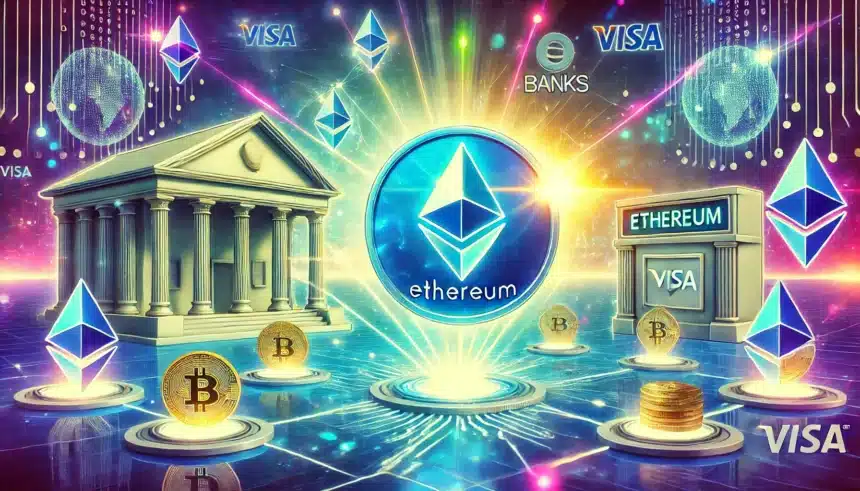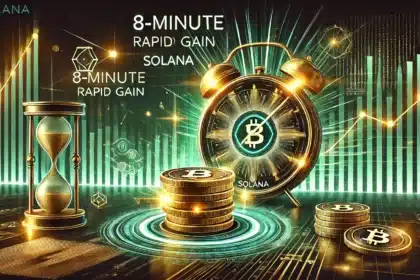Visa is deemed a global leader in payments technology and the enterprise has leapt further in the blockchain space by bringing its new platform that will empower banks to issue fiat-backed tokens on the Ethereum network, as reported. This innovation will back the development of tokenized assets, using smart contracts to iron out and automate conventional financial processes.
Visa has been connected with blockchain and digital assets, and this latest venture is set to integrate real-world assets with decentralized technology.
What Does Visa Tokenized Asset Platform (VTAP) Entail?
The recently launched Visa Tokenized Asset Platform (VTAP) will enable financial institutions to build fiat-backed tokens that are backed by smart contracts. These tokens are reportedly expected to digitize and automate the exchange of real-world assets (RWAs), providing a more efficient and near-real-instant settlement process for transactions related to commodities, bonds, and other asset classes.
Sources report that Visa’s aim with VTAP is to help banks and other financial bodies migrate towards the digital economy by offering them the tools to tokenize traditional assets. By using the Ethereum network, Visa supposedly aspires to build a safe and dependable infrastructure for handling fiat-backed tokens, making it convenient for financial institutions to work in tokenized asset trading.
BBVA to Debut Pilot on Visa’s Platform in 2025
Spanish bank BBVA is one of the first financial institutions to collaborate with Visa’s VTAP. The bank aims to build a live pilot using the platform in 2025, making it a notable early adopter of the technology. BBVA’s use of fiat-backed tokens through the Visa platform will entail buying tokenized real-world assets like commodities and bonds. The process will be facilitated by near-real-time settlement, enhancing transaction speed and cutting down dependence on conventional financial systems.

Visa’s statement supposedly heralded that the platform could transform how financial institutions operate with RWAs, making the entire process more streamlined. BBVA’s pilot project is expected to be a huge milestone in showcasing the potential of fiat-backed tokens in a real-world scenario.
Visa’s History with Blockchain and Digital Assets
Visa has been working with blockchain and digital asset technologies for many years. In March 2021, Visa was reported to begin processing cryptocurrency payments in stablecoin USDC on the Ethereum network. This step was one of Visa’s first ventures into integrating blockchain technology with its conventional payment systems.
Bringing fiat-backed tokens through VTAP further adds to Visa’s blockchain initiatives, enabling the company to stay at the forefront of digital finance. The platform aspires to offer a safe and efficient solution for financial institutions to delve into the tokenized asset arena without the need to develop their own infrastructure from the ground level.
Additionally, earlier in September, Visa broadened its blockchain involvement by partnering with Brazil’s central bank on a pilot project to learn about a central bank digital currency (CBDC). According to sources, this partnership is part of Brazil’s current efforts to create a CBDC, and Visa’s participation reflects its dedication to advancing digital assets and blockchain technologies across the globe.
Visa’s VTAP is poised to influence the future of financial systems massively. By allowing the use of fiat-backed tokens and real-world asset tokenization, Visa is giving banks and financial institutions a way to advance their services while cutting costs linked to traditional settlement processes.

Conclusion
To conclude, this new initiative could set the stage for the widespread adoption of fiat-backed tokens in the financial landscape. The potential advantages comprise more efficient trading, prompt settlement times, and enhanced transparency. As more financial institutions like BBVA embark on these technologies, the industry might see an inclination toward digital asset management, using blockchain as the foundation. Learn more about fiat-backed tokens with TheBITJournal.
Follow us on Twitter and LinkedIn and join our Telegram channel to be instantly informed about breaking news!
https://twitter.com/Thebitjournal_
https://www.linkedin.com/company/the-bit-journal/


























